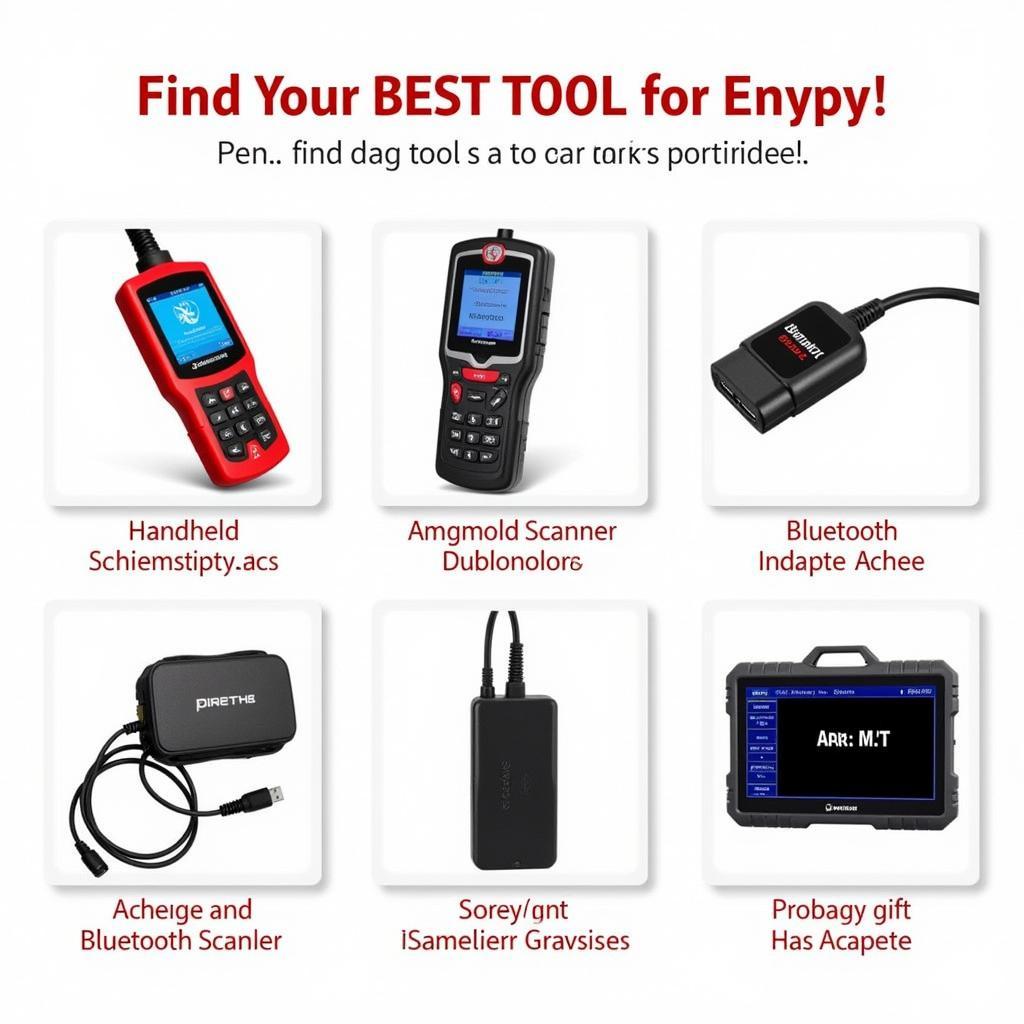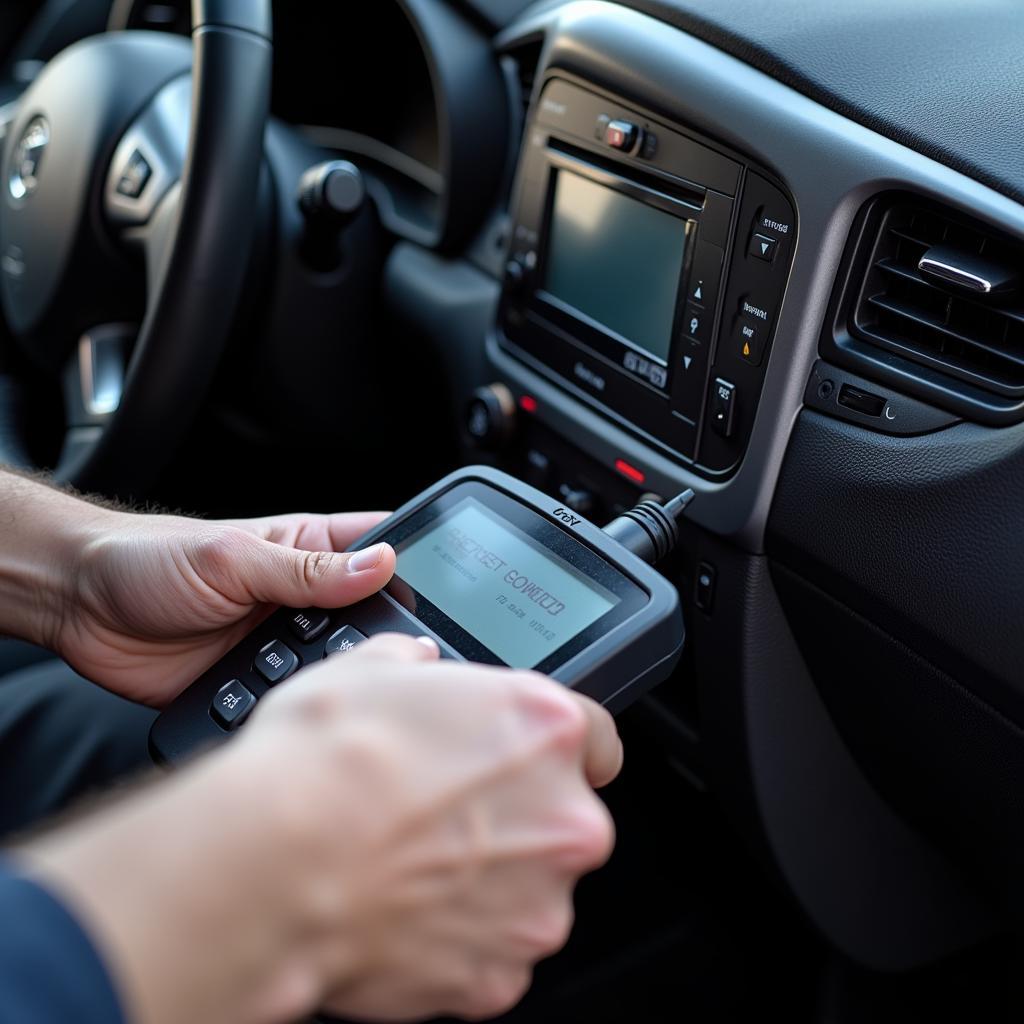Navigating the world of car repair can feel like venturing into uncharted territory, especially with the ever-increasing complexity of modern vehicles. But what if you could demystify the process and even empower yourself to tackle some of those repairs head-on? That’s precisely where a Diagnostics Tool For Cars comes into play. These powerful devices, once exclusive to professional mechanics, are now readily available to car enthusiasts and everyday drivers alike. This comprehensive guide will delve into the world of car diagnostic tools, providing you with the knowledge and confidence to choose the right one for your needs and effectively use it to keep your vehicle running smoothly.
 Top-Rated Car Diagnostic Tools
Top-Rated Car Diagnostic Tools
Understanding the Power of Diagnostics Tools for Cars
Before we dive into the specifics, let’s first understand what a car diagnostics tool actually does. In essence, it acts as a direct line of communication with your car’s computer system, allowing you to access a wealth of information about its health and performance. By plugging into your car’s OBD-II port (typically located under the dashboard on the driver’s side), these tools can read and interpret diagnostic trouble codes (DTCs) that are triggered when your car experiences an issue.
Think of DTCs as your car’s way of telling you something’s wrong. However, instead of vague warning lights, you get specific codes that pinpoint the problem area. With a diagnostics tool, you can decipher these codes, understand the underlying issue, and make informed decisions about repairs, potentially saving you time, money, and unnecessary trips to the mechanic.
 Mechanic Reading Car Diagnostic Codes
Mechanic Reading Car Diagnostic Codes
Types of Diagnostics Tools for Cars: Finding Your Perfect Match
From basic code readers to advanced professional-grade systems, the market is flooded with a wide array of diagnostics tools for cars. Choosing the right one can seem daunting, but understanding your needs and budget can help narrow down the options:
1. Basic Code Readers: Your Pocket-Friendly Problem Solver
As the name suggests, basic code readers primarily focus on retrieving and displaying DTCs. They are generally compact, easy to use, and extremely affordable, making them a great entry point for car owners who want to dip their toes into the world of diagnostics.
Pros:
- Budget-friendly: These tools offer the most affordable way to read and clear basic DTCs.
- User-friendly: Their simple interface and straightforward functionality make them perfect for beginners.
- Portable: Their compact size allows you to keep them in your glove compartment for on-the-go diagnostics.
Cons:
- Limited functionality: They typically only read and clear basic codes, lacking advanced features.
- No live data: You won’t be able to access real-time sensor data or perform advanced diagnostics.
2. Bluetooth Adapters and Mobile Apps: Diagnostics on the Go
Taking convenience to the next level, Bluetooth adapters plug into your car’s OBD-II port and transmit data wirelessly to your smartphone or tablet. This data is then interpreted by a dedicated mobile app, providing you with a wealth of information about your car’s health and performance, all in the palm of your hand.
Pros:
- Convenience: Access diagnostic information directly on your smartphone or tablet.
- Portability: The small adapter is easy to carry and use on the go.
- Advanced features: Many apps offer live data streaming, graphing capabilities, and even maintenance reminders.
Cons:
- App dependency: Functionality is limited by the features and quality of the chosen app.
- Compatibility issues: Ensure the adapter and app are compatible with your car’s make and model.
3. Handheld Scan Tools: The DIY Mechanic’s Best Friend
Handheld scan tools are the middle ground between basic code readers and professional-grade systems. They offer a wider range of features and functionality, including reading and clearing DTCs, viewing live data streams, performing actuator tests, and even accessing manufacturer-specific codes.
Pros:
- Versatility: Offer a good balance between features, functionality, and ease of use.
- Stand-alone operation: No need for a separate device like a smartphone or laptop.
- Advanced diagnostics: Can access more in-depth information and perform some advanced functions.
Cons:
- Higher cost: More expensive than basic code readers but still significantly cheaper than professional systems.
- Steeper learning curve: May require some time to learn and navigate all the features.
4. Professional-Grade Diagnostics Systems: The Mechanic’s Arsenal
As the name suggests, professional-grade diagnostics systems are the top-of-the-line tools used by dealerships and professional mechanics. These systems offer the most comprehensive range of features, including advanced diagnostics, programming capabilities, access to manufacturer-specific information, and much more.
Pros:
- Unmatched functionality: Can perform virtually any diagnostic or programming task.
- Comprehensive coverage: Designed to work with a wide range of vehicle makes and models.
- Regular updates: Manufacturers provide regular software updates to keep up with the latest technology.
Cons:
- Significant investment: The most expensive option, often costing thousands of dollars.
- Complexity: Require extensive training and knowledge to fully utilize their capabilities.
Choosing the Right Tool for Your Needs
With a better understanding of the different types of diagnostics tools available, you can now choose the one that best aligns with your needs, budget, and level of automotive expertise. Here’s a quick guide to help you decide:
- For occasional code reading and clearing: A basic code reader is a cost-effective solution.
- For convenient diagnostics on the go: Opt for a Bluetooth adapter and a reputable mobile app.
- For DIY repairs and more in-depth diagnostics: A handheld scan tool offers the best balance of features and affordability.
- For professional-level diagnostics and programming: A professional-grade system is a worthwhile investment for experienced mechanics or serious enthusiasts.
 Professional Mechanic Using Diagnostic Tool on Car
Professional Mechanic Using Diagnostic Tool on Car
Conclusion: Empowering Yourself with the Right Diagnostics Tool
A diagnostics tool for cars is no longer a luxury reserved for professional mechanics. It’s an invaluable asset for any car owner who wants to understand their vehicle better, save money on repairs, and ensure optimal performance. By carefully considering your needs and budget, you can choose the right tool that empowers you to confidently tackle car trouble and keep your vehicle running smoothly for years to come.

Leave a Reply